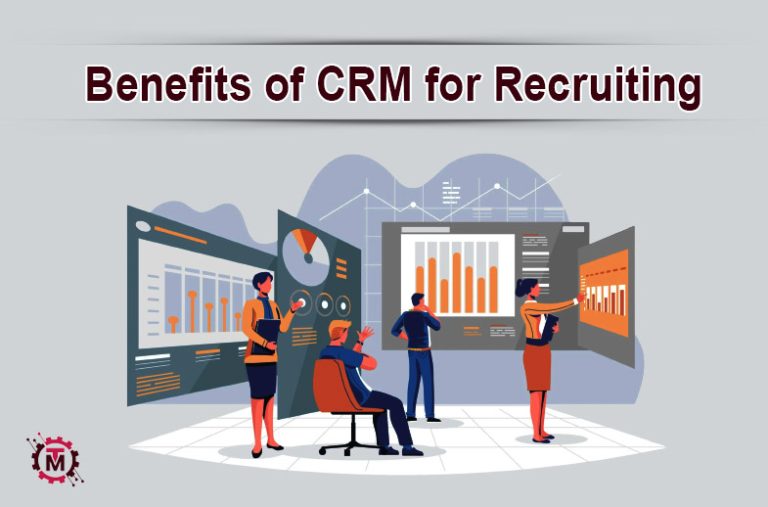Hiring the right talent is essential for gaining and maintaining success in today’s digital business landscape. The capacity to draw in exceptional candidates who resonate with a company’s principles and objectives can make a significant difference. However, standard recruitment procedures often fall short of meeting the demands of an admiringly competitive job market.
This is where Customer Relationship Management (CRM) software intervenes to redefine the hiring process. Customer Relationship Management (CRM) for recruiting is a transformative approach. It simplifies development relationships with candidates, simplifies the talent search, and allows companies to make data-driven hiring decisions.
In this article, we will explore the statistics that highlight the effect of CRM on recruitment success in business.
What is CRM (Customer Relationship Management)?
CRM (Customer Relationship Management) integrates companies’ methods, approaches, and technologies to oversee and evaluate customer engagements and information across the customer journey. The objective is to improve customer service connections, stimulate sales expansion, and support customer retention.
CRM systems aggregate customer data from diverse channels and touchpoints, like the company’s website, social media networks, live chat, phone interactions, direct mail, and marketing collateral. CRM systems furnish frontline staff with comprehensive customer information, like purchase history, personal details, concerns, and preferences.
Statistics That Show How CRM for Recruitment
Statistics are crucial for comprehending the actual influence of any technology or process. This segment will examine the most recent data illustrating how CRM has transformed the recruitment sector.
Improved Hiring Quality
According to findings from the Aberdeen Group, businesses that employ Customer Relationship Management (CRM) for recruiting experience a 60% improvement in the caliber of their hires.
Utilizing a data-driven strategy and advanced analytics helps recruiters to identify and onboard top-tier talent, individuals who align most effectively with the organization.
Companies can realize numerous advantages that typically surpass those offered by conventional recruiting methods by harnessing the capabilities of CRM.
Reduce Time to Hire
CRM systems significantly reduce time-to-hire by streamlining the recruitment process. As per a survey conducted by Glassdoor, businesses employing CRM for recruiting witness a 43% reduction in the time it takes to hire, in contrast to conventional recruitment approaches.
The streamlined workflows and automated processes empower recruiters to swiftly identify, evaluate, and interact with candidates to accelerate the hiring process.
Improved Candidate Engagement
The integration of CRM into the recruitment process has led to a noteworthy 72% surge in candidate engagement, as revealed by research from Jobvite. This increase is attributed to the implementation of personalized communication and ongoing support for candidates.
With the fostering of stronger relationships through these strategies, CRM has proven instrumental in making it more likely for candidates to accept job offers that showcase the positive impact of CRM on overall candidate engagement.

Benefits of CRM for Recruiting
In the fiercely competitive realm of talent acquisition, a business perpetually seek inventive solutions to entice and secure top-tier candidates. The conventional manual recruitment method is time-consuming and ineffective, resulting in overlooked opportunities and restricted access to a varied talent pool.
Let’s explore how your business can use the capabilities of recruitment software to attain a competitive advantage in the talent market:
Centralize Data
Inefficient data management frequently undermines business operations, resulting in various challenges. When essential information cannot be swiftly located, it translates to financial losses for the company due to wasted time and decreased productivity.
Implementing a CRM system addresses this issue by consolidating data and streamlining access. Instead of dispersing spreadsheets, documents, and files across different locations, all information is centralized.
This prevents critical data loss and improves efficiency when retrieving details about prospective candidates, ultimately saving valuable time.
Increase Productivity
Boosting productivity poses a significant challenge for business owners. One effective strategy to enhance efficiency is the adoption of a Customer Relationship Management (CRM) system. This tool enables meticulous project progress tracking that provides insights into the time and effort invested in each endeavor.
Armed with this information, informed decisions can be made regarding the prioritization of future projects. Additionally, a CRM system facilitates increased productivity by enabling focused attention on specific tasks and projects at any given time.
Monitor Performance
Implementing a CRM system helps you to track performance effectively, which is particularly beneficial when managing numerous employees. For instance, it provides insights into whether recruiters meet their targets and details their daily activities.
This data is instrumental in pinpointing areas requiring enhancement to confirm optimal resource utilization for your business. Identifying inefficiencies, such as a recruiter spending only half their time on valuable tasks, becomes possible through performance monitoring.
Increase Repeat Business
A CRM system lets you maintain a comprehensive record of all previous job applicants at your company. This facilitates efficient recruitment processes by enabling you to reconnect with candidates when new opportunities arise.
The system aids in monitoring the level of interest applicants have in specific positions. If a candidate withdraws or declines an offer, this information allows for swift redirection to another suitable candidate to prevent the unnecessary expenditure of time and resources on redundant interviews.
Data-Driven Decision Making
CRM systems’ data analytics and reporting features empower recruiters to make informed and strategic hiring decisions. Recruiters can analyze recruitment metrics to monitor key performance indicators (KPIs) and pinpoint bottlenecks in the hiring process.
This helps the identification of successful sourcing channels and areas for improvement, ultimately improving the overall candidate selection process.
Final Verdict
Implementing Customer Relationship Management (CRM) in recruitment is a game-changer for businesses seeking top talent. The statistics showcase improved hiring quality, reduced time-to-hire, and improved candidate engagement. Leveraging CRM not only centralizes data, increases productivity, and monitors performance but also facilitates repeat business by maintaining a comprehensive record of applicants.
CRM ensures compliance with regulations, contributing to cost savings and streamlined recruitment activities. The data-driven decision-making capabilities of CRM empower recruiters to make informed choices, ultimately providing a competitive edge in the dynamic realm of talent acquisition.







